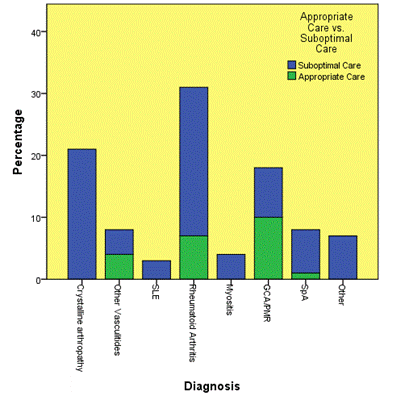Session Information
Session Type: Abstract Submissions (ACR)
Background/Purpose:
One-fourth of hip fractures occur in men. Three groups of men are at high risk for fracture: those who have already suffered a fragility fracture, those treated with androgen deprivation therapy for prostate cancer, and men treated with oral glucocorticoids for at least 3 months. Rapid bone loss occurs in the first 3 months of steroid use, peaks at 6 months and slows with continued use. In addition hypogonadism in chronic disease also may contribute to fracture risk. Men with rheumatic diseases taking glucocorticoids may not receive adequate screening or treatment compared to females. The American College of Rheumatology recommends that males over age 50 who take chronic glucocorticoids be screened for treatment and prevention of osteoporosis (OP). We assessed adherence to these guidelines in a busy academic practice.
Methods:
A retrospective chart review identified male patients 50 years or older with a rheumatic diagnosis seen from 2010 to 2013. Inclusion criteria were 1. Patients who received any dose of prednisone for at least 3 months; and 2. Seen for at least 3 clinic visits. Exclusion criteria were 1. Recognized osteoporosis; and 2.Prior bisphosphonate use. Most patients had incident prednisone use. We collected demographic data, dose and length of steroid use, timing of DXA from initiation of prednisone use, T-score and calcium and vitamin D supplementation use. We defined appropriate care as screening with a baseline DXA within 6 months of initiation of prednisone, calcium and vitamin D supplementation and bisphosphonates use when indicated. Patients not meeting these criteria were defined as receiving sub-optimal care. Fisher’s exact test was used to compare categorical variables.
Results:
100 patients met inclusion criteria; 50% were Caucasians with a mean age of 63.4 (SD 8.4 (51 – 85)) and had rheumatoid arthritis. 76% were taking 7.5 mg of prednisone or higher for at least 3 months and 62% for greater than 12 months. T-scores were available for 57 patients. 61% of T-Scores were found to be abnormal. 53% were treated with calcium and vitamin D and only 31% with bisphosphonates when indicated. 78% of the patients received sub-optimal care for glucocorticoid induced osteoporosis (GIOP) management. 35% of junior faculty (< 5 years out of fellowship) compared with 13% of senior faculty (> 5 years from fellowship) managed patients appropriately (P= 0.014). OP screening for Vasculitis and PMR was more likely compared to other diseases (Figure 1).
Conclusion: The majority of patients who took significant amounts of prednisone for > 3 months received sub-optimal osteoporosis care. To our knowledge, this study is the first to analyze this problem, and identifies a potential gender gap in management of OP in a vulnerable population with inflammatory diseases taking steroids. More vigilance appears needed to managing GIOP, a potentially modifiable risk factor in male patients with rheumatic diseases.
Figure 1.
Disclosure:
H. Shah,
None;
N. Annapureddy,
None;
J. A. Block,
None;
R. Jain,
None.
« Back to 2014 ACR/ARHP Annual Meeting
ACR Meeting Abstracts - https://acrabstracts.org/abstract/glucocorticoid-induced-osteoporosis-screening-and-treatment-in-a-cohort-of-male-patients-with-underlying-rheumatologic-diagnosis-in-a-tertiary-care-setting/

